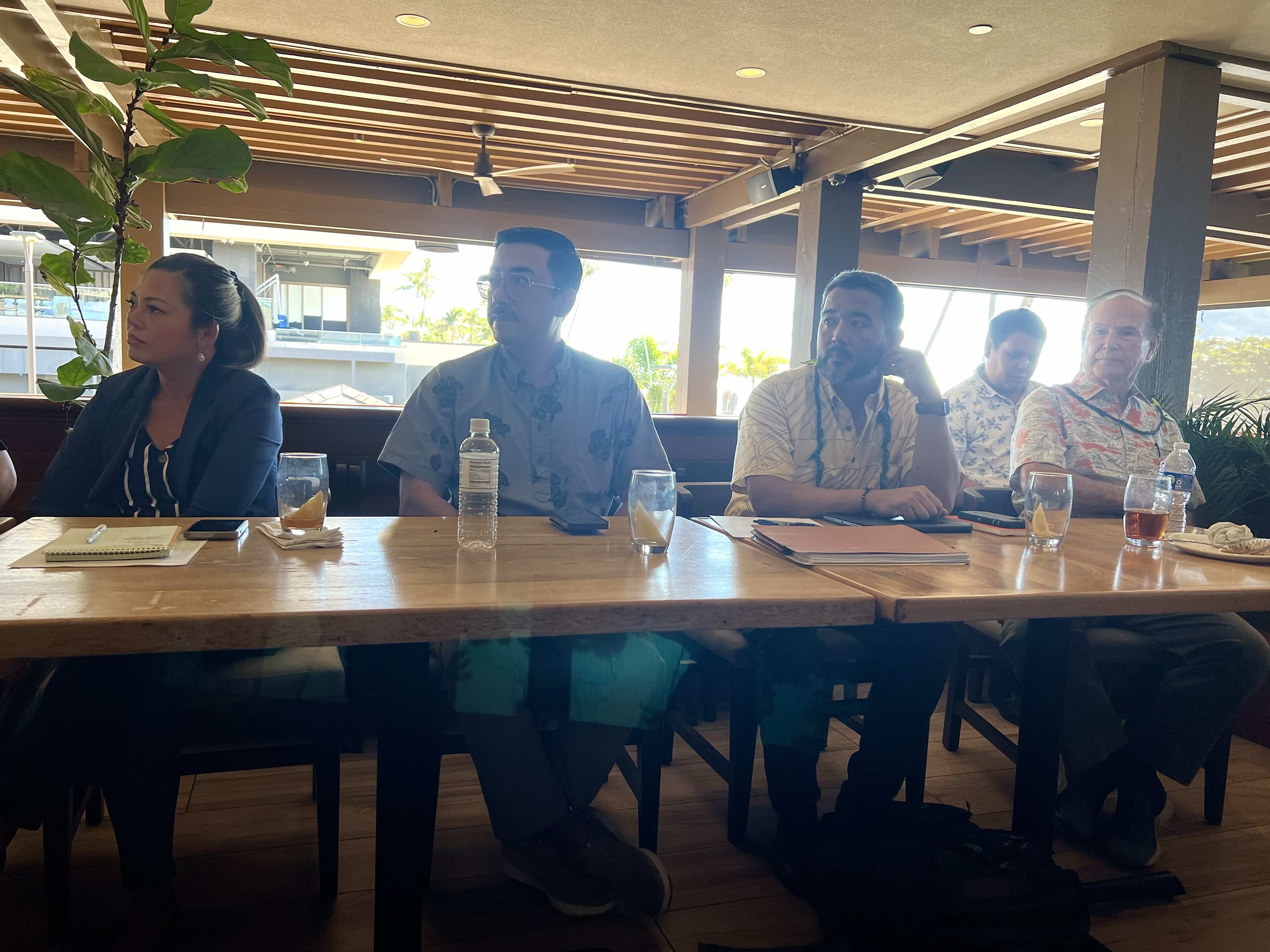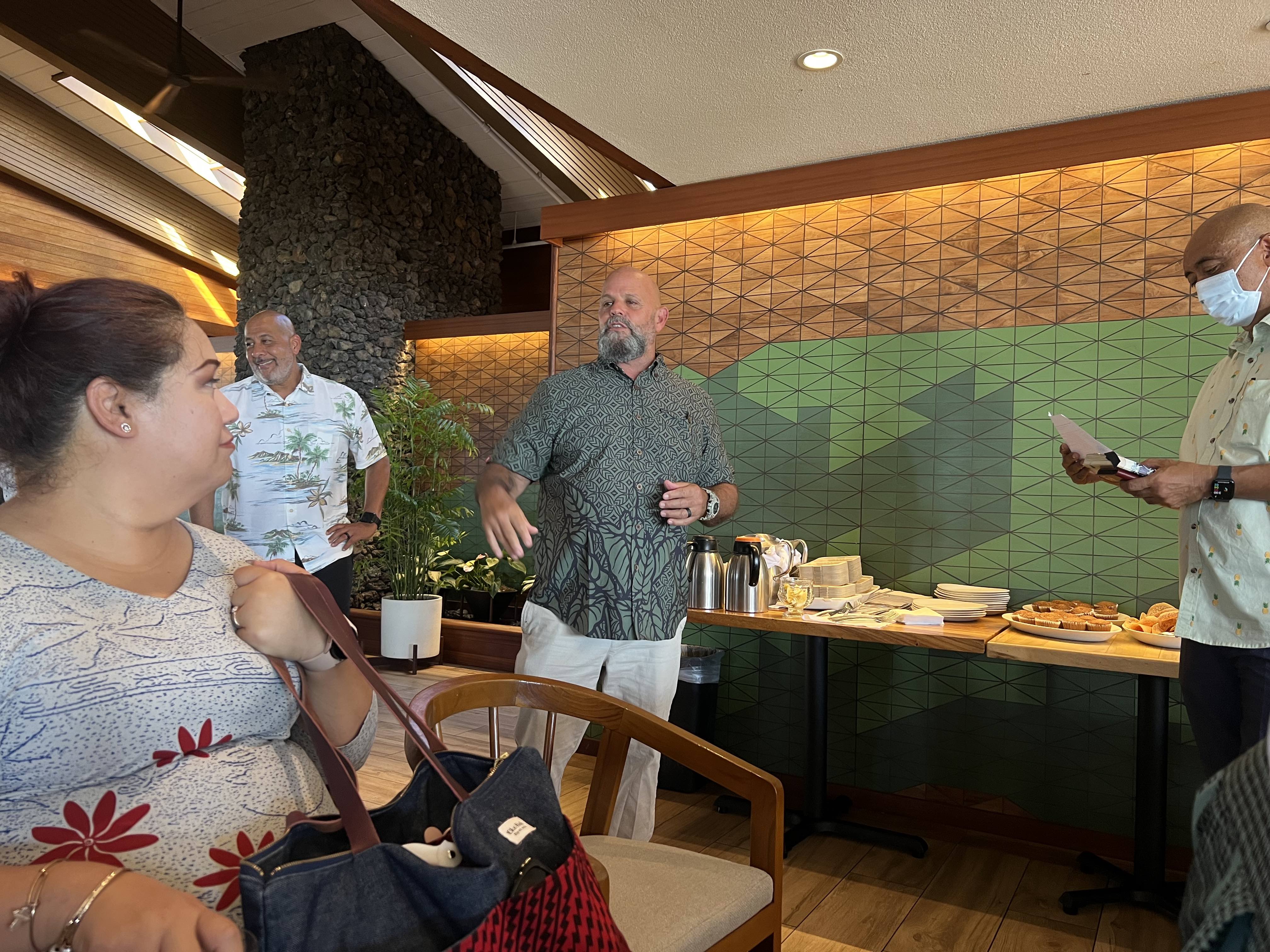Recap of Meeting with Hawaii State Legislature's House of Representatives Jobs and Business Working Group
Recap of Meeting with Hawaii State Legislature's House of Representatives Jobs and Business Working Group
- October 30th, 2023
 On October 26th, we met with House Representatives who listened to the concerns of our industry properties, restaurants, breweries, retailers, and boating/ocean charters of West Maui. Led by the Maui Chamber of Commerce, notable leaders met at Leilani’s on the Beach who generously hosted an informal style “talk story” on the lanai with ono finger foods, tea and coffee. Mahalo to Jason Doenez, GM of Leilani’s, a TS Restaurant of Kaanapali, for his heartfelt welcome and hospitality.
On October 26th, we met with House Representatives who listened to the concerns of our industry properties, restaurants, breweries, retailers, and boating/ocean charters of West Maui. Led by the Maui Chamber of Commerce, notable leaders met at Leilani’s on the Beach who generously hosted an informal style “talk story” on the lanai with ono finger foods, tea and coffee. Mahalo to Jason Doenez, GM of Leilani’s, a TS Restaurant of Kaanapali, for his heartfelt welcome and hospitality.
Rep. Andrew Takuya Garrett, Rep. Daniel Holt, Rep. Sean Quinlan, Rep. Trish La Chica and Rep. Gene Ward all took notes of the SBA denials and frustrations, mortgage obligations for commercial buildings, lack of water supply to surviving buildings in the impact zone, frustrations with DNLR, thoughts on clean up and realistic rebuilding timelines, lack of housing and push for vacation rentals to host displaced. While we give this briefing to our best ability, please note that our condensed recap is not a full representation of those who presented concerns.
Many of the issues heard were regarding those surviving buildings of the impact zone. Many of the owners or business leases of those buildings are still receiving bill demands even though they cannot operate or produce income with those structures. For example, the restrictions of entry, lack of infrastructure, and untold clean-up timelines leave these businesses and building owners without any control over their repayment ability or marketability. Other obstacles that owners of surviving buildings of impact zone are facing are the new fencing or “walls” now blocking entrance and parking. Furthermore, no timeline is being communicated for infrastructure needs and many businesses are seeing weekly departure of employees dependent on those businesses that cannot resume their business.
From the ocean perspective, charters are being told to share a slip at alternative harbors, which is not logistically possible and is forcing some boat owners to be without a safe place for their vessel. While talk of Lahaina’s harbor being repaired and ready-for-use is rumored, the delayed timeline is causing many smaller businesses to close, sell, or be forced to buy a different style of boat that can handle the harsher climate of Maalaea’s structure and winds. Owners of boats destroyed in the fires have been told they will risk losing the very competitive boat slip space if they cannot pay the slip fees. These harbor slips take years on a waitlist to obtain and hold the key to a charter company’s revival. Only last week, were the last two remaining submerged boats of at least seventy-two known sunken vessels retrieved from the waters.
On a personal level, many small business owners who employed staff who lost homes to the fires, now house their own employees. When applying for funds or assistance programs, it often takes weeks before answers or referrals to other agencies are returned. Some who had hopes of rebuilding the historic Front Street as a relic of what it once was are now hearing the reality of updated shoreline rules and changes being presented for building materials due to fire precautions.
In taking action, some businesses pivoted by creating export relationships for Maui to build income through. Maui Gold Pineapple, a member through the Hawaii Farm Project, is negotiating to export pineapple and other agricultural products to Canada. Another micro-business is considering purchasing an RV to both live in and run its business from since the re-building plans seem realistically five to seven years per a Construction Industry of Maui representative. Queen Kaahumanu Center, another MHLA Allied member, is offering those businesses who used to reside in the Lahaina impact zone, to relocate to their Kahului location for a rent-free period of three months as many cannot wait for Lahaina town to rebuild or find affordable commercial rent elsewhere. Furthermore, some suggested re-planting vegetation into the sections of Lahaina previously filled by sugarcane and tropical lush prior, to replenish the moisture and health needed for the land to resist such fire damage again.
Lastly, lack of affordable long-term housing for the impacted was emphasized as the biggest issue in the way of recovery for all Maui. Instead of waiting for rebuild or the hopes of new home units, a consensus seemed to take place at the end of this meeting: A hope for collaboration of community with current vacation rental owners to turn the current, short-term inventory into long-term inventory for residents, a hope to streamline permitting and building processes to allow new constructions for residents to expedite, and a hope to forgive all mortgages, rents, permits, leases, and slip payments, liquor license payments, and utility bills for those of the impacted areas for as long as the impacted areas of Lahaina and harbor waters are unoperational, uninhabitable, and unable to generate income.

Become a Member Today!
Benefit from successful lobbying, quarterly mixers, participation in active advisory councils, oversight of state and county legislation that may affect your business, and our weekly newsletter.
Join Now Contact Us
